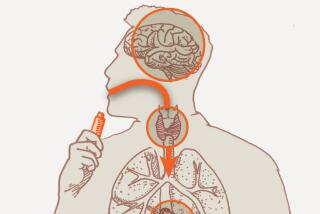Don’t want toxins in food? Then eating could be tricky
- Share via
Toxicologists are quick to point out that raw, natural foods -- just like processed ones -- are themselves complex chemical mixtures. Start analyzing them and you’ll find tens of thousands of chemical compounds, not all of them good for you.
“What protects us is that these chemicals are present at very, very low levels, and we have defense mechanisms in place,” says Michael Pariza, a food toxicologist and microbiologist at the University of Wisconsin.
The best-known research in the field comes out of UC Berkeley, where Lois Swirsky Gold has been studying naturally occurring pesticides and synthetic chemicals in foods for the last 25 years.
She points out that hundreds of plant chemicals have been found to cause cancer in rats or mice when given in extremely high doses.
“A healthy diet contains rodent carcinogens galore,” says Gold, director of the Carcinogenic Potency Project at Berkeley. “Ninety-nine percent of the chemicals that people take in are natural.”
A partial list of foods with naturally occurring, but toxic chemicals includes apple, apricots, bananas, basil, beets, broccoli, coffee, cantaloupes, tomatoes, mustard, cardamom, carrots and lettuce. They include chemicals such as benzyl acetate, caffeic acid, coumarin, quercetin, and respertine -- all produced by plants to defend themselves against fungi, insects and other predators.
In addition, many more chemicals are formed during cooking. For example, more than 1,000 chemicals have been identified in roasted coffee, many of which are produced through roasting. Acrylamide is one of those.
Humans have natural defenses that protect against these chemicals, both natural and synthetic. The point, says Gold, is that it’s impossible to avoid them; a better focus is spent on the known causes of human cancer: obesity, excessive alcohol consumption, smoking, hormones, viruses and infectious agents such as hepatitis B and hepatitis C.
Gold’s research has led her to estimate that Americans consume 1.5 grams (or 1,500 milligrams) of these natural pesticides a day -- about 10,000 times more than they absorb in synthetic pesticide residue.
Of the 72 natural pesticides tested in high-dose cancer tests, which identify the level at which animals get sick, 38 have proven carcinogenic. Acrylamide is only one of many natural chemicals in the diet that cause cancer in high doses in rats.
“No diet can be free of rodent carcinogens,” Gold says. “You would think the way we regulate, it would be the opposite. But nature is not benign.”
More to Read
Eat your way across L.A.
Get our weekly Tasting Notes newsletter for reviews, news and more.
You may occasionally receive promotional content from the Los Angeles Times.









